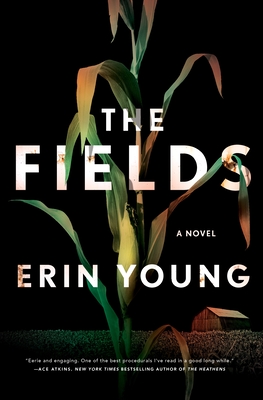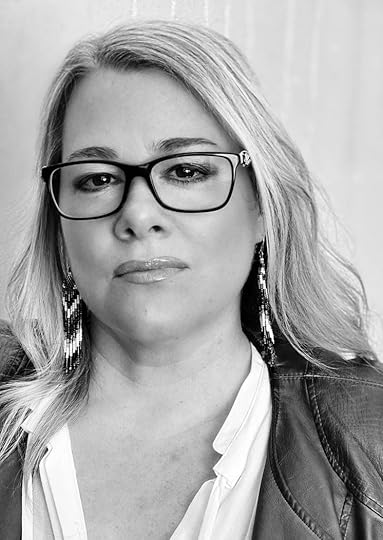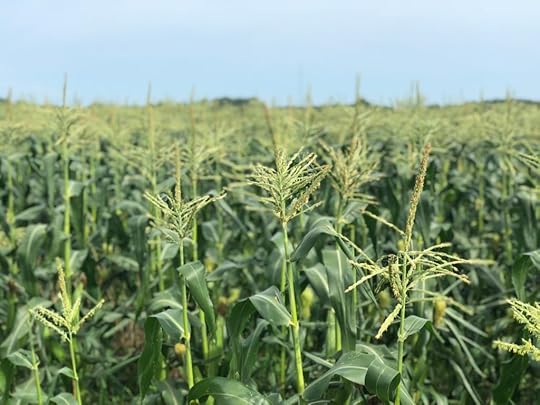What do you think?
Rate this book


345 pages, Hardcover
First published January 25, 2022
Never tell.--------------------------------------
It was an oath she had broken first, many months later, the words heaved from her in sobs, her parents’ expressions frozen, Ethan stumbling from the room, his face ashen. The secret once shared—once detonated—had destroyed them. Not in the first blast, but slowly, inexorably. A sickness in the heart of their family. A poison that lived for years, quietly working in each of them.
It’s not heaven. It’s Iowa.Damn, did he have that right. The Iowa of Erin Young’s The Fields is a hell of a lot closer to The Children of the Corn than it is to any Field of Dreams. After spending some time in Cedar Falls and its larger sibling, agro-urban wasteland town, Waterloo, where the rust-belt meets the corn-belt, you might swear off dreaming altogether. Well, town might be down-playing it a bit. Between the two (both are real places) they total about 100,000 souls (not counting livestock), so maybe small cities rather than towns. Abba may have been on to something when they referred to Waterloo. (Couldn’t escape if I wanted to) Some truly can’t. One of those turns up dead in a cornfield.
----------Ray Kinsella in Shoeless Joe
If not for the University of Northern Iowa—where she’d majored in criminology—with its annual influx of students and money, Riley guessed Cedar Falls would have slumped into the same depression as Waterloo. There had been some brave attempts at regeneration in recent years—microbreweries sprouting on weed-covered lots, kayaks for hire on the Cedar River and an annual Pride festival, fulminated against by local churches. But they were fighting a strong downward pull.

Cooperatives were how some smaller Iowa farms had been able to survive the relentless advances of Big Ag. By dominating the market in hybrid seeds, fertilizer and pesticides—the holy trinity of crop production—through aggressive trademarking, swallowing up the competition and tactical lobbying at the highest levels of government, giants like Agri-Co had come to control much of the nation’s agricultural wealth.Been out there for days, been ripped at in an unusual way, was maggoty, ripe, and unsettling. No problems with an ID, though, once Sergeant Fisher arrives on the scene. Chloe Miller (nee Clark) was one of Riley’s besties two decades back, in high school. But they’d gone their separate ways. Seeing Chloe brings back a terrible time from Riley’s youth, a time that had derailed her life, a time she could never forget.

an article she read about the menacing power of Big Agriculture. A decision to set the novel in Iowa, corn-capital of the world, led her to make a fascinating journey across the state – from chance encounters with cops and farmers, and an audience with a local mayor, to shooting Glocks and getting caught in supercell storms. - from her websiteA voice is given to concerns about the darker implications of increasing concentration in the age of the agro-industrial complex.
A necessary evil, some called them. Progress, said more. But to those whose forefathers had farmed this land since the days of the first families from New York, Philadelphia, and Virginia, who’d settled here after the Black Hawk War when the Ioway had been driven west, these corporations were vultures, polluters and thieves.(Entirely unlike the settlers who drove out the natives, I presume.) So, not exactly a tension-free relationship between local growers and the bigger side of the farming industry, personified here by the Agri-co corporation. We get a strong oppo position from an activist determined to head off even more governmental pro-corporation actions.
Companies like Agri-Co only care about profit, not the soil and water they infect with their chemicals, or the wildlife they destroy. Cancer rates are rising from pesticides, and, still, their political allies and lobbyists help them sow their poison.She blames the current governor, up for re-election, for his role in this. Concern with big-Ag concentrating power at the expense of smaller producers and fouling the environment in the process finds an echo in another part of the country.
It was almost a year since Logan joined the department, moving with his folks from Flint. His father, niece, and nephew had been badly affected by the crisis there—when lead seeped into Flint’s water supply after city officials changed the system in an attempt to save money, then tried to cover up the devastating consequences.It is clearly impossible to run from the national corporation-led degradation of our environment, or from pervasive public corruption.

Waterloo was lifeless in the stagnant air. Smoke seeped from factory chimneys and the Cedar flowed sluggish and brown. Although the roads were clogged with trucks and trailers, there were few people about, just a few vagrants shambling along broken sidewalks, and cleaners and hospital workers trudging to or from shifts…It wasn’t long before she saw the old meatpacking plant on the outskirts of the city…Its twin smokestacks were dark fingers against the pallid sky, old bricks the color of rust. The bottom windows were boarded over, the ones higher up mostly shattered. A chain-link fence surrounded the site, bristling with barbed wire…stepping over heaps of rubbish, she found herself in a cavernous hall. Metal steps ascended to gantries that crisscrossed in between pillars and snaking pipes, conveyor belts and wheels. It all looked like some complex ride at the state fair, only made of metal and rust, fractured glass and hooks. She imagined the steers and hogs shuddering round, the iron spike of blood, steam from spilling guts. Parts of the gantries had collapsed. In places, the floor yawned into darkness.A good book should teach you something about the world while delivering a good story. You will certainly get a sense of the perils of Big Ag, the history of how such concentration got started, and the impact it has had on the economy and the people of this area (presumed to be comparable in all farming states) You will learn a bit about the potential and potential dangers of genetic research for crops. And will learn some Ag lingo.
The lifeblood of rural America was being drained, leaving husks of cities, where poverty and crime rushed in to fill the void. It was a legacy all too visible in the boarded-up factories and processing plants that loomed like broken tombs around the city, haunted by vagrants and hookers, and cruised nightly by the squad cars of Waterloo PD.







Thank you to Netgalley for providing me an ARC!